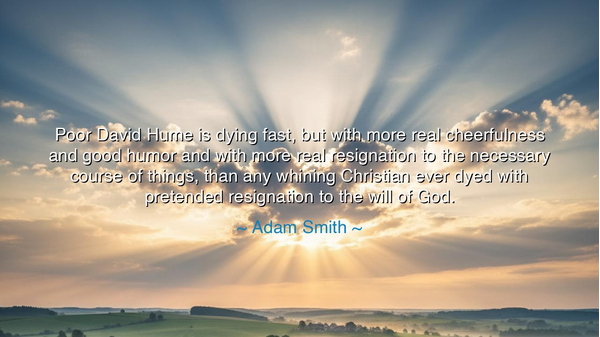
Poor David Hume is dying fast, but with more real cheerfulness
Poor David Hume is dying fast, but with more real cheerfulness and good humor and with more real resignation to the necessary course of things, than any whining Christian ever dyed with pretended resignation to the will of God.






In the solemn and reverent words of Adam Smith, philosopher and friend, we find not merely a report of death, but a testament to the triumph of reason and serenity over fear: “Poor David Hume is dying fast, but with more real cheerfulness and good humor and with more real resignation to the necessary course of things, than any whining Christian ever dyed with pretended resignation to the will of God.” Beneath these words lies a reflection both noble and unsettling — for Smith, though speaking of one man’s passing, speaks also of the eternal struggle between faith and understanding, between appearance and truth, between the calm wisdom of acceptance and the false comfort of denial.
The origin of this quote lies in Smith’s account of his dearest friend, the philosopher David Hume, who, near the end of his days, faced death with remarkable calm. Hume, a skeptic and a man of reason, had long questioned the dogmas of organized religion and sought truth through inquiry rather than faith. When illness came upon him in 1776, he did not cling to illusions of divine intervention nor fear the end of consciousness; instead, he met his fate with cheerfulness and composure, seeing death as a natural continuation of the order of things. To Smith, this quiet courage stood as a rebuke to those who professed faith but trembled before mortality — for here was a man without creed, yet filled with grace in the truest sense.
In these words, Smith does not mock faith itself, but hypocrisy — the kind that hides fear behind pious words. He contrasts Hume’s “real resignation” to the natural course of existence with the “pretended resignation” of those who speak of trusting in God, yet despair when death draws near. Hume’s acceptance was not born of arrogance, but of understanding: he saw that life and death are two threads of the same fabric, and that to resist the latter is to misunderstand the former. In this, Smith’s account carries the quiet majesty of the Stoics — those ancient philosophers who taught that peace lies in aligning one’s will with the nature of things.
Consider the example of Socrates, who, condemned to death by hemlock, faced his end with the same serenity that Hume displayed centuries later. Socrates comforted his followers, speaking not of sorrow, but of curiosity for what lay beyond. “No evil can happen to a good man,” he said, for goodness resides not in what fate brings, but in how the soul meets it. So too did David Hume, unshaken by the fear of divine judgment, find courage in the reason that had guided his life. Both men remind us that death need not be the end of dignity; it may, if met with peace, be its crowning proof.
In Smith’s words, there is also compassion. He calls Hume “poor David” not in pity, but in affection — an acknowledgment of the frailty of flesh and the greatness of spirit. Hume’s good humor in the face of death reveals not levity, but strength. To laugh when the hour grows dark is the highest form of wisdom, for it declares that life’s essence cannot be extinguished by its ending. The “necessary course of things,” as Smith calls it, is the rhythm of nature itself — birth, decay, renewal — and those who truly understand it can walk calmly into the dusk, knowing they are part of something eternal.
Yet this account is not only a eulogy for a philosopher; it is a mirror for the living. Smith’s words challenge us to ask: How do we face what we cannot change? Do we meet hardship with complaint, or with courage? Do we disguise fear with pretense, or transform it into peace through understanding? The lesson of Hume’s passing is not atheism, but authenticity — the resolve to live and die without deceit, to find serenity in truth rather than comfort in illusion.
So, my child of the future, take this teaching to heart: live in harmony with the necessary course of things. Whether your faith is in reason or in God, let it make you calm, not fearful; let it make you kind, not proud. When misfortune comes, do not rail against it, but face it with grace. When your time comes to depart this world, may you do so as Hume did — with good humor, with acceptance, and with a spirit unclouded by pretense. For the one who meets the inevitable with peace is not conquered by death, but transcends it.
Thus, in the friendship of Adam Smith and David Hume, we find a timeless parable: that true faith — whether in nature, in reason, or in God — is not measured by words, but by the heart’s composure when the end draws near. Let their example remind us that to live wisely is to prepare always to die serenely, and to greet the last hour not with fear, but with the quiet laughter of one who understands.






AAdministratorAdministrator
Welcome, honored guests. Please leave a comment, we will respond soon